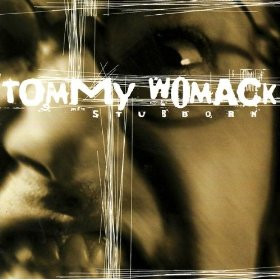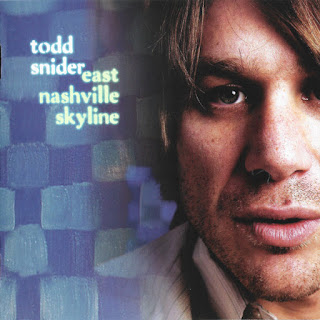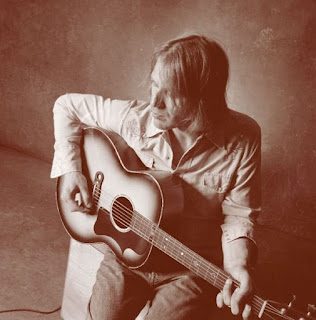Monday, April 29, 2024
Vintage Review: Todd Snider’s Step Right Up (1996)
For Step Right Up, his sophomore effort, he’s put together a solid collection of songs, performed by a fine band that includes Nashville talent Will Kimbrough. I have to wonder aloud, however, if there’s anything here that is going to get heard above the din and hype of current releases by folks like Dave Matthews and that Hootie guy. Not that Step Right Up is a bad, or even mediocre disc. It’s a crackerjack collection, showcasing Snider’s incredible wit and impressive ability to turn a phrase. The music is a healthy mix of country and rock that may be just too much of each and not enough of either to receive significant radio airplay and promotion.
Cuts like “Elmo and Harry,” “Enough,” or the deceptively funny “T.V. Guide” remind me of nothing so much as a more countrified Elliott Murphy. Snider’s lyrics shoot from the hip, but are delivered from the heart and appeal to the intellect. A real talent, Snider has backed himself with an electric and energetic live band in the Nervous Wrecks. Hopefully Step Right Up will find a home somewhere in between the playlists of Triple-A and Americana formats, for it would appeal to fans of both. (Margaritaville Records/MCA, released 1996)
Review originally published by R Squared zine
Friday, April 26, 2024
Vintage Ads: White Animals' Ecstasy album ad from Nashville Intelligence Report
At their peak, the White Animals were one of the three most popular bands in Nashville along with Afrikan Dreamland and Jason & the Nashville Scorchers. Their sound was entirely unique and without peer on the college radio circuit. This Nashville Intelligence Report ad was for their third Dread Beat Records album Ecstasy, released in 1984.
Monday, April 22, 2024
Vintage Review: Tommy Womack's Stubborn (2000)
Both artists write great songs with slightly skewed lyrical perspectives, and both have a keen eye for skilled sidemen. Whereas Nielsen would enter the studio with various Beatles in tow, Womack records with the cream of Nashville’s underrated rock music scene, talents like Will Kimbrough, George Bradfute, Mike Grimes, Ross Rice, and Brad Jones. Womack may have a more southern-fried perspective than Nielsen, but the parallels are obvious.
Tommy Womack’s Stubborn
Womack’s Stubborn opens with the chaotic “Rubbermaid,” a short stream-of-consciousness rant similar to Captain Beefheart or John Trubee, backed by syncopated drums and flailing harmonica. It jumps from there right into “Up Memphis Blues,” an energetic rocker with a blues edge that includes some tasty slide guitar courtesy of Al Perkins. “Christian Rocker” is a hilarious interlude with fantastic imagery dropped in between songs while “I Don’t Have A Gun” is an angry blues tune featuring appropriately tortured vocals from Womack and some southern rock styled six-string work from Womack and George Bradfute.
“For The Battered,” a song from Womack’s old band and Southeast legends Govt. Cheese, is recycled here as an electric blues with some wicked, dark-hued slide guitar from Will Kimbrough supporting the story. It’s the most powerful musical statement that I’ve heard on domestic violence and I still get chills every time the asshole girlfriend beater’s karma catches up with him. Stubborn’s lone cover is of the Kink’s “Berkeley Mews,” a somewhat obscure Ray Davies gem offered here in a fairly straight-forward rendition that says as much about Womack’s sophisticated musical tastes as it does about his ability to pull the song off on record.
Junkies, Whores, and Ne’er-do-wells…
Most critics, when writing of Womack, praise his songwriting abilities, pointing out the numerous characters that live in his songs. They’re really missing Womack’s strongest skill, however – any hack can people their songs with junkies, whores, and ne’er-do-wells of various stripes (listen to any heavy metal lately?). Womack’s strength is in his composition of memorable lines, clever and intelligent lyrical bombs often thrown into the middle of songs to infect the listener’s consciousness days after hearing a song. Witness some of the poetic explosives hidden in the songs on Stubborn: “I’d crawl back in the womb right now if Jesus would show up and point the way.” “Gonna find me a woman who won’t fall apart on the witness stand.” “I want to be a Christian rocker but the devil’s got all the good drummers.” “She was a Presbyterian in a porno picture, tossing her values aside.” “You can all go straight to hell, you’d better cut and run, get on your knees and thank the lord that I don’t have a gun.”
It’s a skill that separates Womack from the mundane “Music Row” factory writers in Nashville even as it marginalizes him from the whitebread world of radio and mainstream music. It also shows his Southern heritage as religious tradition and rock ‘n’ roll yearnings clash for the soul of the songwriter with the resulting imagery creating some of rock’s best rhymes. Among southern rockers, only Jason & the Scorchers’ Jason Ringenburg and, perhaps, Alex Chilton match Womack word for word.
The Reverend’s Bottom Line
The material and performances on Stubborn sound more confident, Womack’s talents sharply honed by a couple of years of live shows and collaborations with other artists. A gifted storyteller, an amazing songwriter and an energetic performer, Womack is one of Nashville’s best and brightest. Although an indie rocker in style and attitude, Womack’s work deserves the widest audience possible, distribution and promotion that only a major label could provide – if any of the corporate A&R geeks could get their collective heads out of their respective boss’ rear ends long enough to listen. Personally, as long as Womack gets to keep making records like Stubborn, I’ll be happy enough. (Sideburn Records, released 2000)
Review originally published by Alt.Culture.Guide™ zine
Monday, April 15, 2024
Vintage Review: Todd Snider’s East Nashville Skyline (2004)
Todd Snider’s East Nashville Skyline
Considering Snider’s entire oeuvre (and I have heard it all), it’s time, perhaps, for a bit of rock critic heresy: Snider is this generation’s Dylan. Snider’s rootsy blend of rock, folk, blues, and country echoes that of rock’s greatest scribe. If Todd’s lyrics fall short of the weighty measure of “Spanish Boots of War” or “Blowin’ In the Wind,” well, those songs have been written. The Viet Nam War and the ‘60s are history (although Iraq may sadly provide inspiration for anti-war songs for years to come) and two generations have passed since Dylan spawned hordes of imitators. The “grunge” generation’s spokesman has attitude, wit and humor to go alongside the pathos and insight, Snider drawing inspiration from other such troubled wordsmiths as Billy Joe Shaver and Kris Kristofferson much as they did from Dylan.
It’s been ten years since the release of Snider’s excellent debut, Songs For the Daily Planet, which spawned a minor hit with the album’s hidden track, “Talkin’ Seattle Grunge Rock Blues.” During that time, Snider has suffered from problems with drugs and alcohol, spent a night or two in jail, and played hundreds of live shows. He’s suffered the deaths of friends and the whims of a (major) label’s attempts to turn him into a rocking, Paul Westerberg-styled singer-songwriter. It’s really after signing with John Prine’s Oh Boy Records that Snider has blossomed as an artist and performer. Even with an enthusiastic support system behind his work, personal demons have continued to plague Snider, landing him in rehab and struggling to overcome his addictions. East Nashville Skyline, Snider’s sixth studio album, reflects these trials and tribulations. It represents Snider’s finest musical effort yet and represents an exciting new chapter in the artist’s life.
As such “Age Like Wine” is an appropriate opening song for this new chapter. Snider pays homage to Billy Joe Shaver’s “old timer, five-and-dimer” while admitting to himself that “it’s too late to die young now.” It’s a reflective piece, the 37-year-old Snider now trying to “age like wine,” stating that “I thought I’d be dead by now,” perhaps sadly concluding “but I’m not.” The following tale of mistaken arrest is biographical, “Tillamook County Jail” recounting an unwanted stay at one of Oregon’s finest institutions. “Play A Train Song” is one of Snider’s best compositions, a tribute to a fallen friend, the kind of rowdy, charming East Nashville born-and-bred scoundrel that you’d have to have known at some time in your life to truly understand. The minimalist “Sunshine” is about suicide and redemption while “Incarcerated” is a Memphis-styled rocker that evokes Jerry Lee in a story of somebody done somebody wrong.
The Ballad of the Kingsmen
Snider’s “The Ballad of the Kingsmen” is a gem. It starts out with the story of “Louie, Louie” and evolves into an inspired rant on the religious right, Conservative politicians, Marilyn Manson and the doubtful effects of rock music and pop culture on young adults when war is broadcast on TV nightly. A hippie at heart, Snider’s hilariously satirical “Conservative, Christian, Right-Wing Republican, Straight, White, American Males” puts the artist directly at odds with the mainstream zeitgeist and our current, unelected leadership. While Snider pokes fun at both sides of the political equation, he admits that he is “so liberal, I have love for conservatives.”
The most telling moments on East Nashville Skyline come near the end. “Nashville” is a love song, of sorts, to Snider’s adopted hometown, the “Nashville you don’t hear on the radio” as he says in the liner notes. After wandering the country, from Oregon to California to Texas to Tennessee, Snider landed on the other side of the Cumberland River in historic and often troubled East Nashville. Perhaps his wandering days have come to an end, Snider singing that “there ain’t nothing wrong with Nashville, nothing wrong with picking country songs down in Nashville, Tennessee.” Snider’s reading of the pop classic “Enjoy Yourself” closes the album, perhaps an affirmation of Snider’s own struggles, the singer reminding his listeners (and himself) to “enjoy yourself, it’s later than you think.”
The Reverend’s Bottom Line
Assisted by his long-time partner-in-crime, Will Kimbrough (another of Nashville’s criminally overlooked talents), Snider has produced the most solid and enduring album of his career. If fame and fortune haven’t necessarily followed his efforts during the past decade, Snider can take solace in the fact that he nevertheless has a loyal and growing audience.
Thanks to supporters like radio broadcasters Bob and Tom, who regularly feature Snider on their syndicated morning program, Snider also has a national forum for his lively music and a future that can only get better. East Nashville Skyline represents an important new chapter in Snider’s career that, with a little luck and the artist’s talents, will continue another decade and beyond… (Oh Boy Records, released 2004)
Review originally published by Alt.Culture.Guide™ zine
Friday, April 12, 2024
Vintage Review: Will Hoge’s The America EP (2004)
It is no exaggeration to say that Hoge’s The America EP is the most radical, most seditious, and most courageous musical statement that will be made this year. Forget about Steve Earle’s “revolution,” forget about punkvoter.com and Rock Against Bush – the five songs offered here by Hoge are a “state of the union” address delivered straight from the American heartland. That Hoge released the disc himself is no great surprise, considering that multi-national media corporations shy away from independent thought and the sort of artistic freedom represented by The America EP.
Will Hoge’s The America EP
In fact, Hoge did himself and his career no favor by taking a stand with these songs. After spending four years crossing the country in a van and talking to people where they played, Hoge and his band concluded that, “most hard-working Americans don’t feel they have a voice.” This epiphany led to the moment, says Hoge in the EP’s liner notes, “that’s when all of us realized that we had to make this record.” In doing so, Hoge has captured everything that those of us who love rock ‘n’ roll believed about the music in the first place – brash rebellion, the questioning of authority and, most importantly, championing the view of the “little guy.”
“Bible Vs. Gun” kicks off The America EP, a letter home from a soldier caught in the middle of a battle, his religious beliefs put to the test by this ultimate example of man’s inhumanity against man. In the midst of the violence, he sings, “I close my eyes and pull the trigger and kill these people I don’t even know.” He would gladly trade his gun for a Bible and the comfort of his faith. He asks his mother for forgiveness, praying he can still “get into heaven,” but the soldier’s fate is left up in the air as the song closes. Sparse instrumentation builds to a crescendo near the end, Hoge’s bluesy vocals soaring above the mix.
“The Other Side” is a Springsteen-esque tale of despair, an example of the extremes that people will go to when times are tight and there’s no work to be found. “The Other Side” of the song holds a clever double meaning, representing both the poor man’s vision of wealth and the people who enjoy “life on the other side” and the believer’s faith in the afterlife. This might be the best song that Springsteen never wrote, the protagonist a hard working man who makes one mistake, a desperate act committed in an attempt to improve his family’s life. The story is told from the perspective of the man’s son, who holds onto his father’s dream as he sinks into his own black pool of despair. Hoge’s plaintive vocals are accompanied by a martial drumbeat and gentle strings, creating a pastoral setting for an otherwise disturbing story-song.
The Times They Are A Changin’
The America EP closes with the powerful “America,” an anthemic rocker with raging guitars and angry vocals. The song tells the story of an American soldier stationed in a nameless land, fighting a battle where “I’m not sure what I believe in, but I do things I can’t take back.” As for his mission, the soldier concludes, “Is it for freedom or oil or money/It makes no difference either way/It’s just my job, I keep my head down/And hope I make it home someday.”
The soldier returns home alive with a Purple Heart but can find no job, he’s lost his family, and the nightmare of war overwhelm his attempts to sleep. “I fight these battles still waging in my head.” The guitars scream and Hoge’s anguished vocals cry “America, oh what can I do/America, I gave it all away for you,” highlighting the sacrifices made by our men and women in uniform. It is a truly transcendent musical moment, proof that you can support our soldiers while still questioning the President’s (dubious) reasons for going to war. Perhaps unconsciously, Hoge’s words seem horribly prescient. Undoubtedly thousands of American soldiers will return home from Iraq during the next few years to find themselves impoverished, homeless and trying to live with the horrors that they have seen and experienced.
The Reverend’s Bottom Line
Hoge’s The America EP is a minor masterpiece, perhaps the most important example of rock ‘n’ roll patriotism that has ever been recorded. It’s unlikely that Hoge could have released these songs under the sponsorship of a major label. The America EP is illustrative of the freedom and potential of taking music out of the hands of focus groups and putting it back in the hands of the artists. That few people may hear this material is beside the point and quite irrelevant. The important thing is that these songs were recorded in the first place, put out there in the world for people to discover. I salute Will Hoge for taking a stand, and you should, too. (self-released, 2004)
Review originally published by Alt.Culture.Guide™ zine
Monday, April 8, 2024
Vintage Review: The Features' Some Kind of Salvation (2009)
Back in the earlier part of this decade, the Features were fated to be the “next big thing” in Nashville rock ‘n’ roll. Sure, they didn’t have the curious, media-ready backstory of their friends the Kings of Leon, but what they did have was years of hard-won experience on the Southeastern club circuit. After releasing a self-titled indie EP in ‘97, the band delivered a strong (and critically-acclaimed) debut album with Exhibit A for Universal in 2004, but a subsequent clash of wills with the evil media corporation found the Features back out on the street.
The loss of their label deal was a big blow to a young band, no doubt, but unlike many of their brethren, the Features had the steel to persevere. Their return to the rank-n-file of indie-rock resulted in Contrast, a fine five-song EP in 2006 and now, a half-a-decade since their fall-from-major-label-grace, a triumphant full-length effort in the self- released Some Kind of Salvation.
Some Kind of Salvation shows that not only has the band not lost its sense of humor after the whole U-music spectacle, but that they’ve emerged with all of the musical elements that made them so special in the first place firmly intact. The Features’ trademark sound is an odd blend of ‘60s psychedelia and pop, ‘70s guitar-rock, and ‘80s punk/new wave with scraps of Britpop and singer-songwriter angst thrown in for good measure. Behind frontman Matt Pelham’s keening voice and slashing fretwork, the sturdy rhythm section of bassist Roger Dabbs and drummer Rollum Haas build a surprisingly robust structure while keyboardist Mark Bond throws in a little rolling 88’s whenever necessary.
Since the core of the Features has been together for better than a decade, the band’s innate chemistry allows them to follow Pelham’s lead and spin pure magic. For instance, “Wooden Heart” sports a strutting Memphis soul soundtrack within its timeless rock framework as the song’s wall-of-instrumentation is punctuated with blasts of rhythmic guitar and piercing vocal harmonies. “The Temporary Blues” is a working-class coming-of-age tale with insightful lyrics, joyously clashing instrumentation, and Pelham’s appropriately strained vocals.
 |
| The Features |
The electro-pop rhythms of “Concrete” are matched by Pelham’s whipsmart lyrics – “I’m the king of indecision, just sitting on my throne, and if you ask me my opinion, I’ll tell you I don’t know” is a delicious bit of wordplay, while the song’s chorus – “nothing is complete, nothing is concrete, nothing is for certain, as far as I can see” – is pure genius, summing up perfectly both the band’s experience and life overall. “Off Track” sounds like a melancholy version of the Strokes, minus the fog of faux NYC hipness, chiming rhythms and dashes of guitar paired with soulful vocals that are nearly lost in the depths of the mix.
The closest musical comparison that you could make for the Features would be to their Nashville neighbors Lambchop – both bands are talented, unpredictable, and seemingly without fear in their creation of music that is anything but cookie-cutter or trend-following. Whereas Lambchop uses country music as its jumping off point, however, the Features are firmly set in a pop-rock tradition. Onto this musical foundation, Pelham and crew include the playful anarchism of Wayne Coyne and the Flaming Lips, the wry sense of humor of Ray Davies, and probably a 100 or so other influences that are thrown into the blender and come out imminently sounding like nothing other that the Features.
Maybe Some Kind of Salvation provides the band with exactly that – salvation in the wake of their stormy past – and it comes as no surprise that your new favorite rock band closes the album with the pleading “All I Ask,” where Pelham implores “I won’t give up on you, so don’t give up on me.” With this, the Features are well deserving of another shot at the brass ring. The Rev sez “check ‘em out!” (429 Music, released July 28th, 2009)
Review originally published by Blurt magazine
Friday, April 5, 2024
Vintage Review: Bobby Bare Jr's Young Criminals’ Starvation League's From the End of Your Leash (2004)
For his second solo album, Bare Jr has crafted a set of songs that fall somewhere between the raucous rave-ups of his band era and the retrospective country dirges of his debut. Enlisting the help of a dozen-and-a-half of the Music City’s most talented players, including former band members Mike “Grimey” Grimes and Tracy Hackney, as well as various members of Lambchop, Bare Jr has managed to pull off the best of both worlds. “From the End of Your Leash” features songs that are, at times, rambunctious and, at other times, bitingly melancholy. No matter which speed he dials up, Bare Jr manages to seep each song in black humor and deliver his witty, intelligent lyrics in a fractured vocal style that is at once both irritating and entirely contagious.
The finest moment to be found on “From the End of Your Leash” is also possibly Bare Jr’s best song yet, the tongue-in-cheek “Visit Me In Music City.” Bare’s mythologizing of his hometown is simply priceless as he describes hills that are “filled with naked Hee Haw honeys,” guitar strings that grow on trees and police that carry capos “in case you want to change your key.” Bare Jr explains that, in Nashville, “you don’t even have to sing on key…producers with computers can fix it all.” If you visit, Bare Jr sings, “we’ll drink all night and write songs no one will sing.” The song is a glimpse of light revealing the sentimentalist behind Bare Jr’s dark worldview and an indication of the fine music we can expect from the artist in the future. (Bloodshot Records, released 2004)
Review originally published by Alt.Culture.Guide™ zine
Monday, April 1, 2024
Vintage Review: Th’ Legendary Shack*Shakers’ Swampblood (2007)
Th’ Legendary Shack*Shakers’ Swampblood
Now, you have to be careful when going down there, ‘cause much like
Rudderville or Kingfield, folks ‘round these parts get a might touchy if they
don’t know you. If you’re drivin’ too nice or too new of a car, the ‘shiners
might toss a few rounds your way thinkin’ that you’re a Revenue agent or some
other sort of Federale. Tales say that the swamp is haunted by the ghosts of
several Delta bluesmen that gave up thriving careers and settled down right
here, working as farmhands in the nearby tobacco fields. On Saturday nights,
they’d get together with cigar-box guitars and harmonicas and they’d sing.
Somebody would drag some sort of scaly critter out of the swamp and cook it up
for dinner, washing down the dubious feast with some clear, vicious,
foul-tasting liquor.
If you have a mind to venture out into
that neck o’ the woods, I’d suggest that you first make sure that you’re
driving the right kind of car…nothing too flash or too Hollywood, and
certainly nothing made by the flan-factories of Detroit after 1980. Maybe some
sort of early-70s Mopar, like a Charger or Satellite, preferably one with a
few well-earned rust holes, missing chrome and a dirty old sock stuffed in the
gas nozzle. Nobody down around the swamp will look at you twice, especially if
you’re rattlin’ Swampblood, the latest-and-greatest from th’ Legendary
Shack*Shakers, out of your vintage quad sound-system. With the Col. J.D.
Wilkes as your co-pilot across these perilous killing fields, you’re assured
of getting back home alive and kickin’.
Feedback-whipped howls and
nancy banjo-pickin’ comprise the brief instrumental “Dawn,” sounding right at
home surrounded by hanging vines and cypress trees. It’s the perfect-fit intro
to “Old Spur Line,” Swampblood’s kick-off tune and as nasty a slice o’
greasy redneck funk as you’re likely to hear these days. The Colonel’s vocals
are slightly echoed in the mix as he spits out this cautionary tale of
traveling into places that you shouldn’t oughta. The band shuffles along, a
minor thunderstorm behind Wilkes’ haunting vocals. “Hellwater” begins with an
authentic Tony Joe White guitar lick, David Lee channeling the spirit of John
Campbell as he picks out a familiar poke-salad riff and Wilkes belts out a
song about the wages of sin.
Appalachian Hillbilly Hoedown
Properly warmed up by this time, the Colonel and his instrumental army take
Swampblood up a notch; “Easter Flesh” sounds vaguely Middle Eastern in
flavor, with circular riffs and martial rhythms, Wilkes’ up-tempo vocals
bringing some sort of nasty Biblical judgment to the poor unfortunate souls
who resist salvation. The title cut takes us further into the murky water than
we’ve ever been before, the song a raucous, compelling number with manic harp
work and fire-and-brimstone lyrics sung in a possessed voice. Lee’s trebly
fretwork fuels the song’s instrumentation, a rhythmic assault that is as dense
as the morning fog on the bayou.
From this point,
Swampblood descends further into alcohol-fueled madness, each
performance proudly wearing the sweat and fervor of a backwoods preacher as
the Colonel puts his boys through their paces. “Cheat the Hangman” is like a
runaway freighter jumping the tracks and diving headfirst into a muddy river
while “Born Again Again” is an old-timey spiritual with a jug-band soul and a
church-pew heart. “The Deadenin’” proves that it’s not nice to fool with
Mother Nature, the song an environmental anthem that has Wilkes’ howlin’ at
the moon while the band kicks out a wily, smoke-tinted and disturbing
soundtrack behind the Colonel’s gnashin’-and-wailin’ vocals.
There
are several more gems hidden in Swampblood’s grooves that will tickle your
imagination, like “Jimblyleg Man,” an Appalachian hillbilly hoedown with spry
fiddle playin’ and plenty o’ words about some sort of wicked sprite, an
imaginary evil like the chupacabra down in south Texas or West Virginia’s
mothman. “He Ain’t Right” is a rockabilly rave-up that reminds one of Hasil
Adkins. “Angel Lust” has a jazzbo sound that kicks your ears like Professor
Longhair jammin’ with Cab Calloway while Brett Whitacre’s tribal drumbeats and
tasteful fills play along nicely with Mark Robertson’s muscular upright bass
as Wilkes’ swinging vocals take up any remaining slack. Whitacre adds the
accompanying patterns behind the Colonel’s mighty potent
stream-of-consciousness rant “Preachin’ At Traffic.”
Swampblood finishes much like it started, with the somber crosspatch
“When I Die” leading into the fading hill country banjo-maul that is “Bright
Sunny South.”
The Reverend’s Bottom Line
Swampblood is th’ Legendary Shack*Shakers’ fifth studio album, and if
the band never evolves into world-beaters, they’ll always deliver exactly what
you’d expect them to: a combustible blend of roots-rock, honky-tonk country,
electric blues and retro-rockabilly. Yeah, they may be a throwback to a
simpler, highly-rocking time, and hopelessly out-of-step with today’s musical
trends. But as the Colonel says, “I dream in sepia, mono and Beta” – as
defiant a statement of Luddite fist-shaking as has been committed to tape. I
wouldn’t expect th’ Legendary Shack*Shakers to headline the Pitchfork
Festival, but if I ran into them at a cockfight, I’d buy ‘em a mason jar of
whatever they wanted to drink… (Yep Roc Records, released July 16th, 2007)
Review originally published by the Cashville411 website, 2007











